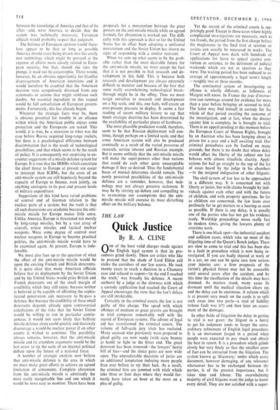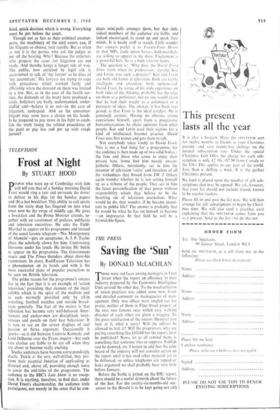Quick Justice
THE LAW
By R. A. CLINE
ONE of the least valid charges made against the English legal system is that its pro- cedures grind slowly. There are critics who like to pretend that the shade of Lord Eldon still stalks the corridors of our law courts. He took twenty years to reach a decision in a Chancery case and refused to repent-1n the end I reached the truth,' was broadly his defence. A recent outburst by a judge at the slowness with which a custody application had reached the Court of Appeal encourages the view that the law's delays are still intolerable.
Certainly in the criminal courts the law is not guilty of this charge. The speed with which offences of medium or great gravity are brought to trial compares remarkably well with the record of European systems. The advent of legal aid has transformed the criminal courts. The volume of full-scale jury trials has rocketed. Many accused who previously were prepared to plead guilty are now ready (with state bounty at hand) to fight to the bitter end. The great deterrent has been removed—the lawyers' heavy bill of fees—and the sluice gates are now wide open. The unpredictable decisions of juries are an additional temptation inducing more people than ever before to try their luck. As a result, the criminal lists are jammed with trials which take three or four days where they would for- merly have taken an hour at the most on a plea of guilty. Yet the record of the criminal courts is sur- prisingly good. Except in those cases where highly complicated investigations are necessary, such as tax frauds, the period from the first charge before the magistrates to the final trial at sessions or assizes can usually be measured in weeks. The Court of Appeal now deals with hundreds of applications for leave to appeal against con- viction or sentence, to the detriment of judicial weekends which are not as spacious as they were. The waiting period has been reduced to an average of approximately a legal term's length —roughly two or three months.
The continental system of investigating an offence is wholly different, as followers of Maigret will know. In France the juge d'instruc- don can rummage around for evidence for more than a year before bringing an accused to trial. The latter may find himself in custody for the whole of that period awaiting the outcome of the investigation, and at last, when the dossier against him is complete, he is brought to trial. There is an appeal pending at this moment before the European Court of Human Rights, brought by an Austrian who has been hanging about in prison for a year and a half awaiting trial. Our criminal procedures can be faulted on many grounds, but there is no doubt that where delay would affect the liberty of the subject our law behaves with almost ritualistic alacrity. Appli- cations for bail go straight to the top of the list of cases heard by the judge in his chambers —to the resigned indignation of other litigants.
The civil system of law has to be approached in a different way. It is concerned not with liberty or juries, but with claims brought by indi- viduals against each other and with the future of children, and with property questions. So far as children are concerned, the law leans over perilously far to get matters to a hearing as soon as possible. If there is any delay, it is usually one of the parties who has not got his evidence ready. Wardship proceedings move really fast in modern times, giving the lawyers plenty of overtime work.
There is one black spot—the industrial accident and collision cases, which take up most of the litigating time of the Queen's Bench judges. These are slow to come to trial and this has been due to a fault in procedure which is now being in- vestigated. If you are badly injured at work or in a car, no one can be quite sure how serious your injuries are :' a firm prognosis of the victim's physical future may not be assessable until several years after the accident, and by this time the recollection of the details may have dimmed. As matters stand, many cases lie dormant until the medical situation clears up, and the delay can be enormous. A reform which is at present very much on the cards is to split such cases into two parts—a trial of liability (whose fault was it?) and then later an assess- ment of the damages.
In other fields of litigation the delay in getting to trial is not great; the litigant in a hurry to get his judgment tends to forget the extra- ordinary refinement of English legal procedure. It is an instrument forged in a period when people were expected to pay much and obtain the best in return. It is a procedure which grinds slowly but very finely so that the smallest atom of fact can be extracted from the litigation. The system known as 'discovery,' under which every document, however damaging, of any relevance whatsoever has to be exchanged between the parties, is of the greatest importance, but it takes time and labour. The overwhelming majority of civil litigants want the judge to know every detail. They are not satisfied with a super- ficial, quick decision which is wrong. Everything must be put before the court.
Though not as fast as their criminal counter- parts, the machinery of the civil courts can, if the litigants so choose, turn rapidly. But as often as not it is the parties who ask the judges to put off the hearing. Why? Because the solicitors who prepare the cases for litigation are not ready. And thereby hangs a longer tale of woe. The public, now enriched by legal aid, is accustomed to talk of 'my lawyer' as he does of `my accountant.' His lawyers are trying to cope with procedures which worked fairly and efficiently when the demand on them was limited to a few. But, as in the case of the health ser- vice, the demands of the many have produced a crisis. Solicitors are badly undermanned, under- staffed and—believe it or not—in the case of litigation, underpaid. And so the consumer- litigant may soon have a choice on his hands. Is he prepared to pay more in his fight to estab- lish the truth (using the refined procedures of the past) or pay less and put up with rough justice?



































 Previous page
Previous page